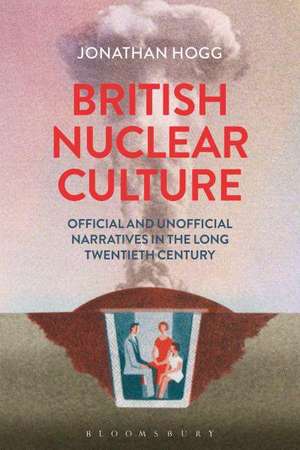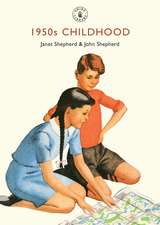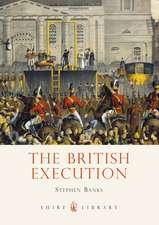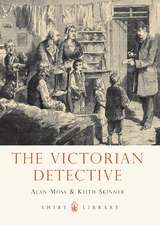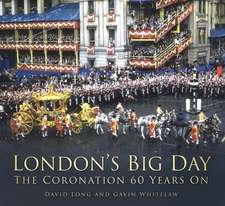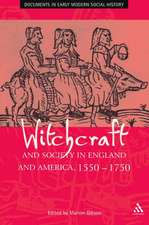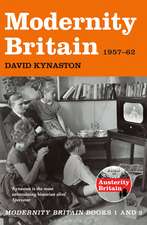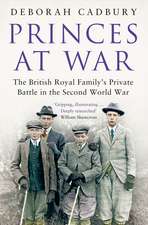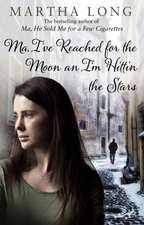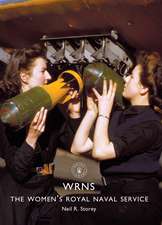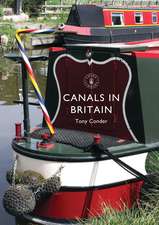British Nuclear Culture: Official and Unofficial Narratives in the Long 20th Century
Autor Dr Jonathan Hoggen Limba Engleză Paperback – 27 ian 2016
| Toate formatele și edițiile | Preț | Express |
|---|---|---|
| Paperback (1) | 179.98 lei 6-8 săpt. | |
| Bloomsbury Publishing – 27 ian 2016 | 179.98 lei 6-8 săpt. | |
| Hardback (1) | 715.42 lei 6-8 săpt. | |
| Bloomsbury Publishing – 27 ian 2016 | 715.42 lei 6-8 săpt. |
Preț: 179.98 lei
Preț vechi: 208.33 lei
-14% Nou
Puncte Express: 270
Preț estimativ în valută:
34.44€ • 36.06$ • 28.56£
34.44€ • 36.06$ • 28.56£
Carte tipărită la comandă
Livrare economică 09-23 aprilie
Preluare comenzi: 021 569.72.76
Specificații
ISBN-13: 9781441169761
ISBN-10: 1441169768
Pagini: 248
Ilustrații: illustrations
Dimensiuni: 156 x 234 x 15 mm
Greutate: 0.41 kg
Editura: Bloomsbury Publishing
Colecția Bloomsbury Academic
Locul publicării:London, United Kingdom
ISBN-10: 1441169768
Pagini: 248
Ilustrații: illustrations
Dimensiuni: 156 x 234 x 15 mm
Greutate: 0.41 kg
Editura: Bloomsbury Publishing
Colecția Bloomsbury Academic
Locul publicării:London, United Kingdom
Caracteristici
Each chapter begins with short contextual, historiographical and thematic essays for helpful chapter frameworks
Notă biografică
Jonathan Hogg is Senior Lecturer in History at the University of Liverpool, UK. He is the author of Using Primary Sources: A Practical Guide for Students (forthcoming).
Cuprins
Introduction1. Early Nuclear Culture2. The Manhattan Project3. 1945 - 1950: Early Responses to the Bomb4. 1950 - 1958: Maturing Responses5. 1958 - 1979: Radicalised and Realist Responses6. 1979 - 1989: Extreme Realism7. 1989 - 2011: The Persistence of Nuclear Culture8. ConclusionTimelineBibliographyFurther ReadingNotesIndex
Recenzii
[A] fascinating new book . It is a real strength . that it introduces the reader to a wide range of sources on the subject . It is also extensively and impressively illustrated.
The first major contribution to what promises to be a significant sub-field of British nuclear history.
Hogg has produced a well-written and accessible history that covers a great deal of ground. It is a thought-provoking study that will appeal to a general readership as well as to students and scholars.
Hogg uses a wide range of primary-source materials to analyse British nuclear culture following the Second World War.
The author persuasively argues that nuclear technology played a greater role in British politics and culture than previously thought. This book complements the extensive literature on the Cold War and contributes to a new understanding of the pervasiveness of the nuclear question in 20th-century Britain.
British Nuclear Culture is an important book for mapping the terrain of this lightly trodden field. Jonathan Hogg has done the journeyman's work of marshaling diverse bodies of cultural production to adumbrate this particular national zeitgeist; indeed, at times his account seems like a catalog of explicit references to the nuclear.
A gift to future scholars of British nuclear culture . It reveals an enormous number of questions and texts that will occupy critics for many years to come.
At long last, a book that takes a long view of Britain's fascination with nuclear science. Jonathan Hogg takes us back to the Victorian age to show that British nuclear culture was born decades before the Cold War and that it flourishes to this day. Along the way, he takes in everything from H. G. Wells and Ewan MacColl to Morrissey and Alan Partridge. British Nuclear Culture will appeal to scholars and students of history, literature, politics and the mass media, and just about anyone interested in why and how Britain has lived with The Bomb.
We know the atomic bomb fundamentally transformed modern life, but Jonathan Hogg shows us that it did not do so in the same way everywhere. This is a important contribution to nuclear studies as it takes both nation and region seriously in the production of a nuclear culture. Hogg does not just follow expert concerns or defense policy debates, he also attends to the vernacular forms of local activisms across British cities and generations. British Nuclear Culture leads the way to a new comparative nuclear studies, and with it, a deeper understanding of the nuclear revolution.
This book offers a far-reaching critical analysis of the extensive reach of nuclear culture, and of the ripple effects that spread, like the concentric circles frequently used to represent an atomic blast, through almost every aspect of British life during the creation and maintenance of the nuclear state.
The first major contribution to what promises to be a significant sub-field of British nuclear history.
Hogg has produced a well-written and accessible history that covers a great deal of ground. It is a thought-provoking study that will appeal to a general readership as well as to students and scholars.
Hogg uses a wide range of primary-source materials to analyse British nuclear culture following the Second World War.
The author persuasively argues that nuclear technology played a greater role in British politics and culture than previously thought. This book complements the extensive literature on the Cold War and contributes to a new understanding of the pervasiveness of the nuclear question in 20th-century Britain.
British Nuclear Culture is an important book for mapping the terrain of this lightly trodden field. Jonathan Hogg has done the journeyman's work of marshaling diverse bodies of cultural production to adumbrate this particular national zeitgeist; indeed, at times his account seems like a catalog of explicit references to the nuclear.
A gift to future scholars of British nuclear culture . It reveals an enormous number of questions and texts that will occupy critics for many years to come.
At long last, a book that takes a long view of Britain's fascination with nuclear science. Jonathan Hogg takes us back to the Victorian age to show that British nuclear culture was born decades before the Cold War and that it flourishes to this day. Along the way, he takes in everything from H. G. Wells and Ewan MacColl to Morrissey and Alan Partridge. British Nuclear Culture will appeal to scholars and students of history, literature, politics and the mass media, and just about anyone interested in why and how Britain has lived with The Bomb.
We know the atomic bomb fundamentally transformed modern life, but Jonathan Hogg shows us that it did not do so in the same way everywhere. This is a important contribution to nuclear studies as it takes both nation and region seriously in the production of a nuclear culture. Hogg does not just follow expert concerns or defense policy debates, he also attends to the vernacular forms of local activisms across British cities and generations. British Nuclear Culture leads the way to a new comparative nuclear studies, and with it, a deeper understanding of the nuclear revolution.
This book offers a far-reaching critical analysis of the extensive reach of nuclear culture, and of the ripple effects that spread, like the concentric circles frequently used to represent an atomic blast, through almost every aspect of British life during the creation and maintenance of the nuclear state.
